In this article:
An allergy means that your body becomes hypersensitive (1) to otherwise harmless substances. These substances are called allergens, which include dust, pollen, pet dander, and certain proteins found in foods, among others.
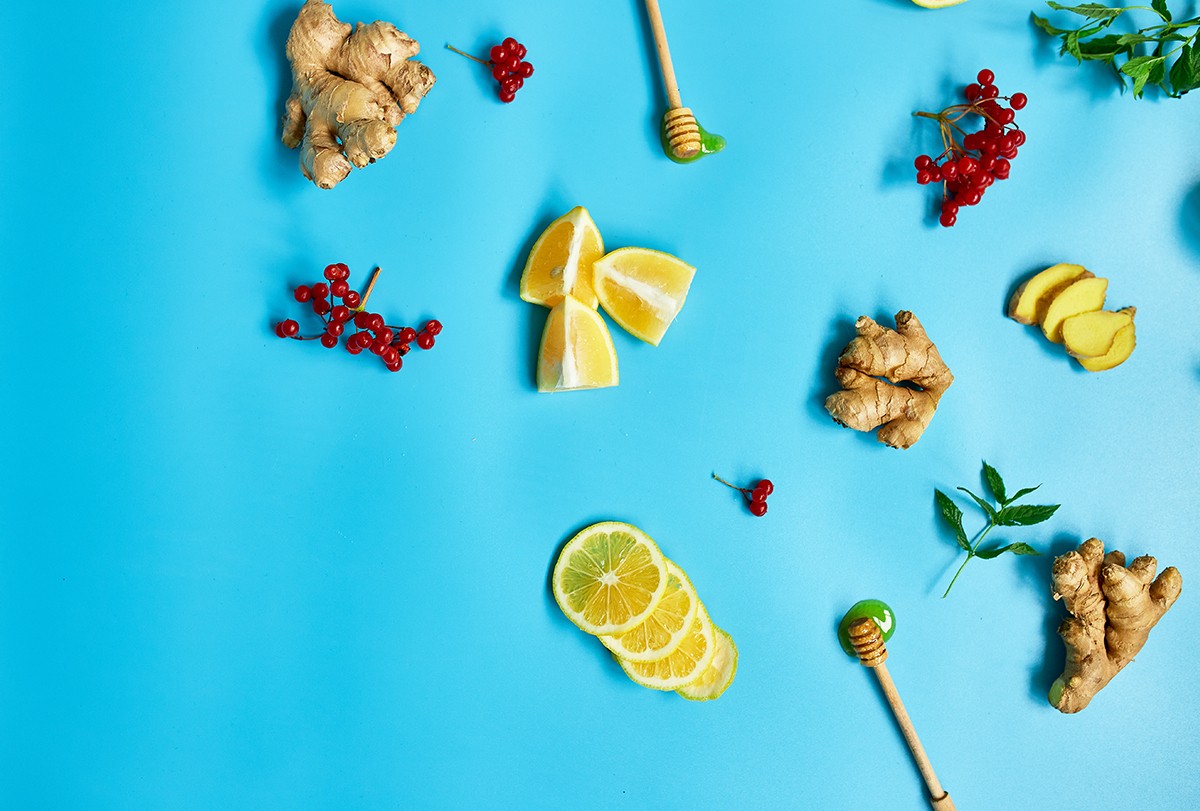
If an allergen enters the body through the skin, mouth, or nose, the immune system wrongly perceives it to be a foreign threat. It then launches a heightened inflammatory response to get rid of it.
This response includes a release of a chemical called histamine, which causes inflammation, usually in the skin, gastrointestinal tract, or respiratory tract. Inflammation manifests in different ways from mild to severe symptoms.
Living with allergies requires you to be constantly mindful of your triggers so that you can steer clear of them, and some allergens are easier to avoid than others.
Always be prepared for a sudden attack. Even mild symptoms can be quite discomforting, which can adversely impact your quality of life on a day-to-day basis.
This article will list foods and spices that are high in anti-inflammatory properties, which reduce the severity and frequency of allergy attacks.
Anti-Allergy Foods
If you suffer from allergies, consider adding the following foods into your diet:
1. Turmeric
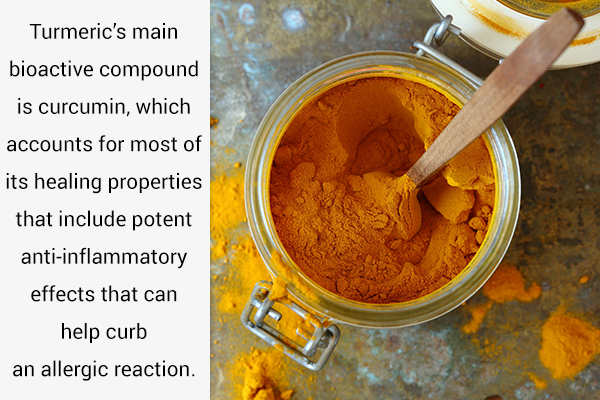
Turmeric has a long history of being used in traditional medicine for addressing various ailments.
Its main bioactive compound is curcumin, which accounts for most of its healing properties that include potent anti-inflammatory effects that can help curb an allergic reaction. (2)
How to consume:
- Pour 2 cups of water into a pot and bring it to a boil.
- Put 1–2 teaspoons of ground turmeric into the boiling water.
- Let it simmer for about 10 minutes.
- Pour into a cup to drink and enjoy.
2. Garlic
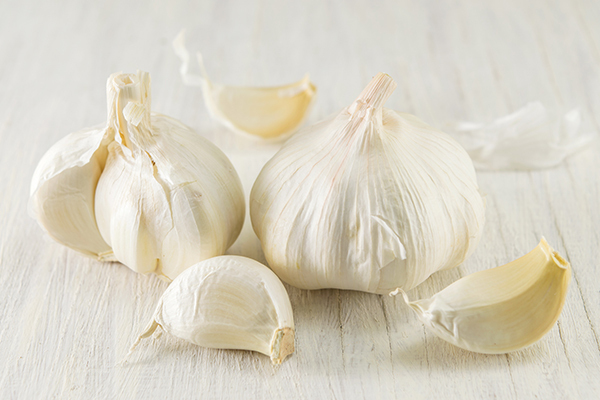
When raw garlic is crushed, it releases one of its main active compounds called allicin. This compound exhibits significant anti-inflammatory activity.
Garlic extracts can help reduce the severity of an allergic reaction by inhibiting the underlying inflammation. (3)
How to consume:
- Consume one or two crushed raw garlic cloves every day.
- Start a garlic supplement, but discuss it with your doctor before you start.
3. Apples
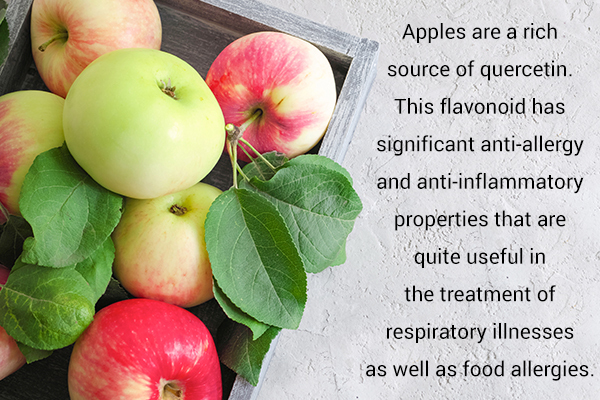
Apples are a rich source of quercetin. This flavonoid has significant anti-allergy and anti-inflammatory properties that are quite useful in the treatment of respiratory illnesses as well as food allergies. (4)
How to consume:
- Eat one apple every day. Choose organically grown varieties.
- Drink a glass of freshly extracted apple juice regularly. (5)
4. Ginger
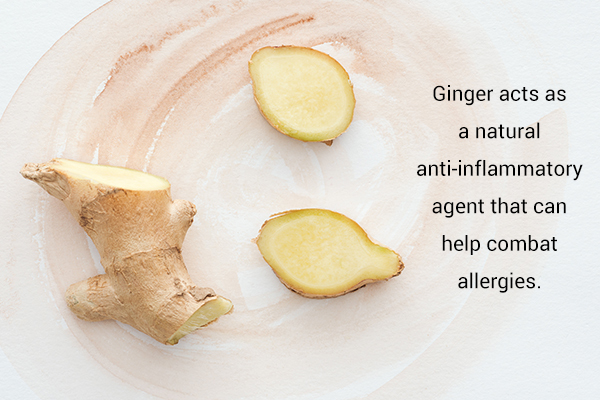
Ginger acts as a natural anti-inflammatory agent that can help combat allergies. It helps counter the inflammatory effects of histamine by reducing the severity and frequency of allergic attacks. (6)(7)
An easy way to derive the medicinal benefits of this ingredient is to consume it in the form of tea.
How to consume:
- Thinly slice a piece of raw peeled ginger.
- Pour 2 cups of water into a small pot.
- Drop in 4–6 ginger slices or more if you want a stronger tea.
- Put the small pot onto the burner and boil the water for 10–20 minutes.
- Strain the tea, and then pour it into a cup and drink.
5. Citrus fruits

Extracts from the peels of citrus fruits such as lemon, grapefruit, and orange are mixed with water to form an aqueous solution. These aqueous solutions are detoxifying agents that flush out allergens from the body.
They are also full of antioxidants with potent anti-inflammatory properties that diminish allergic reactions. These extracts are widely used to produce anti-allergy and anti-inflammatory foods and supplements. (8)(9)
How to consume:
Consume lemon water throughout the day.
6. Flaxseeds
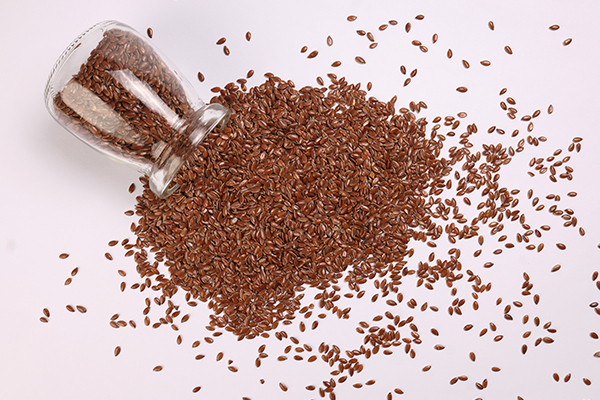
Flaxseeds are high in omega-3 fatty acids including alpha-linolenic acid, which is broken down in the body to release by-products called metabolites. (10) Studies have shown that these metabolites reduce inflammation to minimize allergic reactions.
How to consume:
- Add some freshly ground flaxseeds to your protein shake or breakfast oatmeal.
- Increase your intake of dietary flaxseed oil. (11)
7. Onions
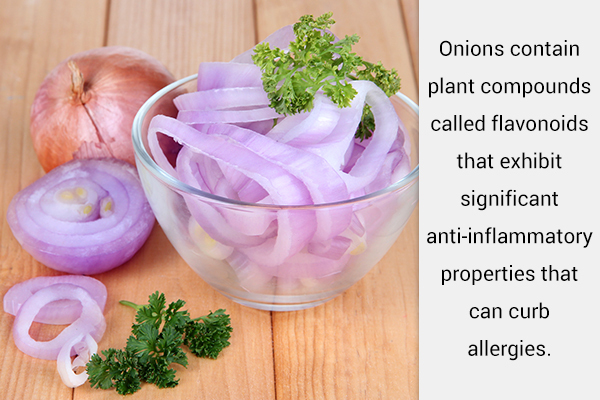
Onions contain plant compounds called flavonoids that exhibit significant anti-inflammatory properties that can curb allergies. The best flavonoids in this regard are quercetin and its conjugates, which are abundantly found in onions. (12)(13)
However, cooking destroys some of these flavonoids, depriving you of their full medicinal effects. Thus, it’s best to eat onions raw to get the most of their anti-allergy potential.
How to consume:
Eat onions raw by adding them to your salads, sandwiches, and dips.
Can You Take Vitamin C to Treat Allergies?
Yes! Vitamin C works as a potent antioxidant that controls inflammation to a great degree. It has been successfully used in the treatment of allergy-related conditions such as asthma, eczema, and hay fever (called allergic rhinitis).
Your body cannot store vitamin C since it is a water-soluble vitamin, which means it is excreted in the urine. Therefore, it is important to get your recommended dose of vitamin C through foods such as oranges, lemons, and grapefruit. (14) You can also consult with your doctor about starting vitamin C supplements.
Final Word
There is no cure for allergies, but you can keep them under control through proper self-care and medication. The first step to managing allergies is to identify triggers/allergens. Then, avoid them as best as you can.
If you suffer an allergic reaction, the treatment will depend on its severity. In most cases, people take antihistamine medication to inhibit the inflammatory response and to relieve the symptoms. However, severe systemic reactions require immediate medical attention.
Remember the anti-inflammatory foods mentioned in this article are not standalone treatments for allergies. You can use them in combination with medication to manage this chronic condition as they help your body fight inflammation better.
- Was this article helpful?
- YES, THANKS!NOT REALLY


